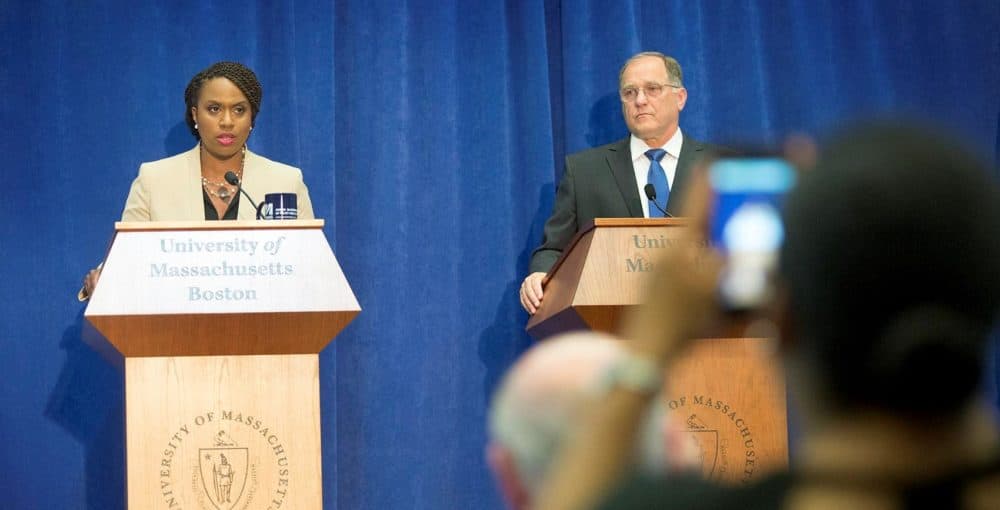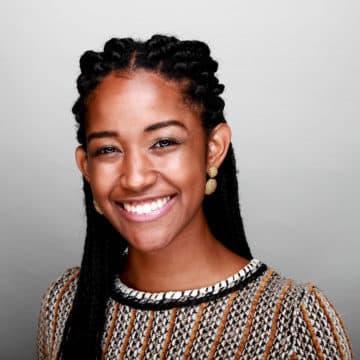Advertisement
Liquor Licenses And The Fairmount Line: Evaluating Pressley And Capuano Claims
Resume
In their debate last week — broadcast here on Radio Boston — the two Democratic candidates in the 7th Congressional District highlighted what they consider to be some of their major accomplishments as politicians.
For Boston City Councilor Ayanna Pressley, it's liquor license reform and equity in Boston. For the incumbent, Congressman Michael Capuano, it's improvements to the Fairmount commuter rail line.
The Boston Globe's Meghan Irons, a social justice and race reporter, helped us analyze those claims. This interview has been edited for length and clarity.
Claim 1: Liquor License Reform
During the debate, Pressley stated the following:
I worked for some four years to reform our state's liquor license laws, working with the City Council, two mayors and our state Legislature to disrupt what was a two-tiered food system, resulting in a density of walkable amenities and restaurants in neighborhoods like the North End, the Back Bay and the South End — and neighborhoods like Roxbury, Mattapan and Dorchester and Hyde Park, which did not have new restaurants for 10, 15, 20 years.
Background
Meghan Irons: "[Pressley] was there from the beginning successfully getting liquor license reform in the state. And what this law did was to give Boston the authority to give out 75 additional licenses over a three-year period. And the goal here was to revive the business districts in neighborhoods ... that are not like Back Bay or the North End or downtown; these are neighborhoods that are struggling for some sort of economic vitality. And she argued — along with the mayor and along with other people — successfully that these neighborhoods could benefit from restaurants that brought in people and their families not only for dinner but for a cocktail or two.
"This law came about in 2014. It had very, very good intentions for the Main Street and business districts. It wanted to chip away at the unfairness in how the liquor licenses had been traditionally doled out — mostly it's to big business owners. ... [A]nd many people who did not have access to a liquor license are often left out of this thriving industry."
What Actually Happened
Irons: "It created this unintentional problem: It created uneven competition. It left out certain neighborhoods. It allowed businesses that were already established to get the licenses. The licenses were intended to be easily attainable — you just have to show where you're going to operate. You have to provide a lease and pay $3,000. In the past, in the unregulated market, licenses were costing upwards of $300,000. But it turned out that only people with establishments and only people with money — restaurant owners, that is — were able to afford them. And so there [was] some business movement in Roxbury ... not one applicant in Mattapan. ... Last year the city, along with Pressley, pressed to get an additional 150 or so licenses but there's no action on that as yet."
Claim 2: Fairmount Line Improvements
During the debate, Capuano stated the following:
The Fairmount Line was a long-term investment, working with Governor Patrick at that time, because if people remember there were only a few stops that were almost never used. We've now increased it by six stops, we've got better trains on the system. And let's not forget that the people running the commuter rail were taking trains out of service on this line to give to other lines. That has stopped.
Background
Irons: "For the people who are living in parts of Mattapan, Dorchester, Hyde Park and Roxbury, they've been completely cut out of rapid rail service from their homes to their jobs downtown, and for years, many of these people have been living with a rail line behind their yards and have seen freight trains running behind their yards, and a little-used commuter rail line, the Fairmount Line. And a lot of effort and years of work went into getting the state to fix up this line to make it accessible for the people who needed fast services to downtown. The activists from across that particular area of the city would tell you that Capuano had been instrumental in securing federal funding to get the line [to be] not just sporadically operating, but a fully functional line.
"Most people would think a commuter rail is going out to the suburbs, but this one operates entirely in Boston. There were problems with pricing, it was too expensive, some people thought. And some people also thought that the state didn't do a very good job in terms of marketing this line, and Capuano has been in that fight. The activists say they needed someone who would be out there pushing this issue for them."
What Actually Happened
Irons: "There's so much hope on this line, and it's struggled with ridership. When that happened, I believe last year, Capuano gave $53,000 of his campaign money to pay for tickets so that people would take the line [and it] could increase ridership, and indeed ridership did go up 55 percent after that first week, I think, and it has tripled since 2012.
"However, there are still problems with increasing ridership — ridership on that particular line lags the other lines in the system, and so there's been a big effort from the activists to get the T to do things like allowing passengers to use their Charlie Card on that line. This is a line that is a commuter rail, but it's trying to be a subway, and it's trying to do a lot of things. There is also hope along the line that there would be development that would bloom as a result of the the expansion and renovation of this line. However, residents are very concerned that whatever is erected around those stations that it would also be detrimental to the renters who are worried about gentrification."
The Issues' Significance
Irons: "Getting that rail line up and running is a major thing. It's a major thing for people who had to take three different buses to get to their jobs. Getting a liquor license is a major thing, even though they didn't count on the fact that it would take a lot more for people who don't have the infrastructure or the asset or the money to come up with the $3,000 and find a building and find a place to open a restaurant. So these are indeed major, major issues, even though they're not fully formed — they still have a lot more work to do and there is a long way to go.
"I do think that the voters in this particular district, this very diverse district, are interested in someone who is going to go to Congress who's going to fight for them and fight the policies that are coming from [the Trump] administration.
"But they're also concerned about the values of the Democratic Party and the people that it represents. And these issues, though they're not national issues, they're very, very local and bread and butter issues, and I think Pressley and Capuano are very, very conscious of the fact that they are still rooted in this district. He's from Somerville, she's from Dorchester — hardscrabble neighborhoods. These are issues that mean well and serve well for the people who live there. They're social justice issues and they're about the quality of life, and I think they're very cognizant of those."
This article was originally published on August 14, 2018.
This segment aired on August 14, 2018.


